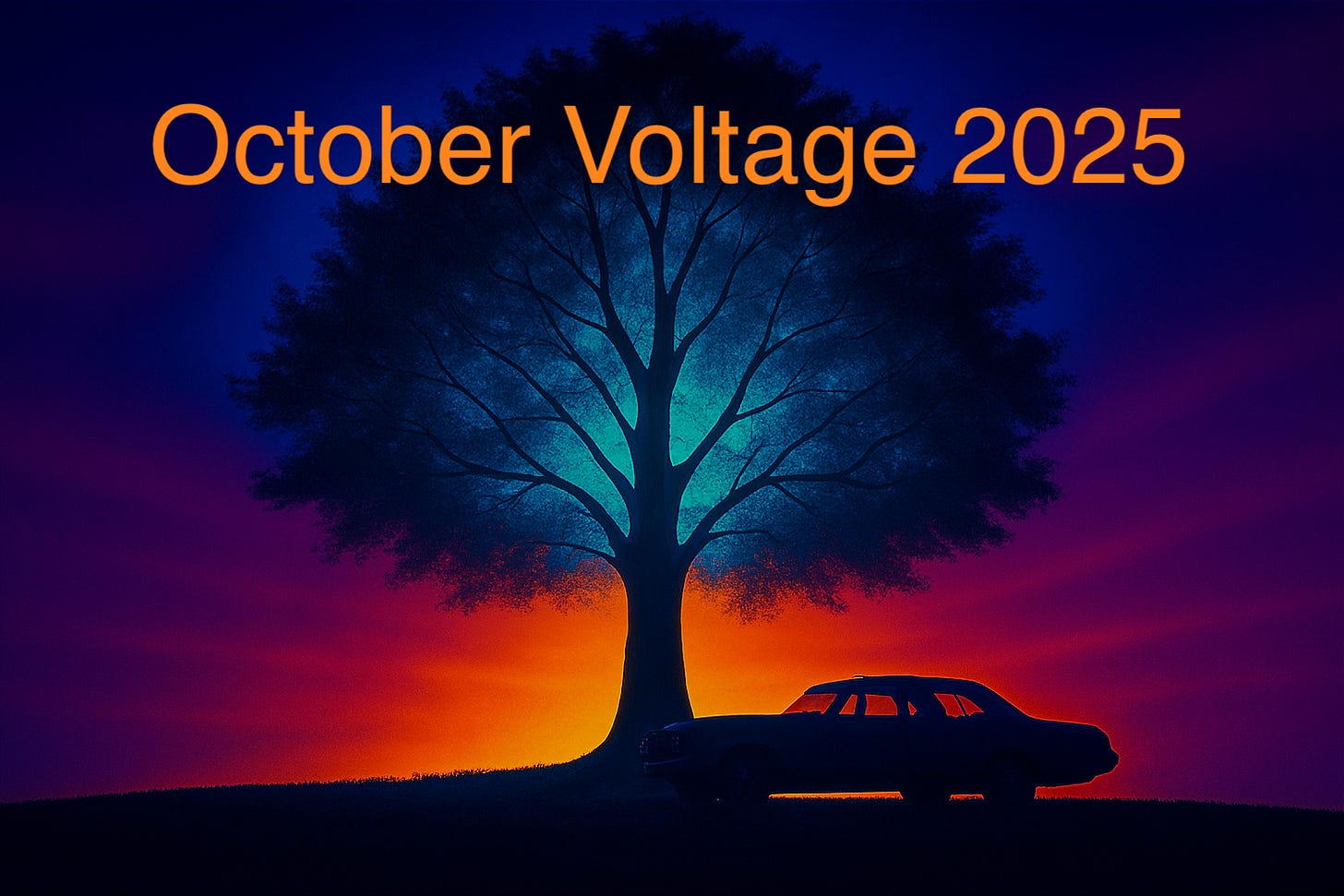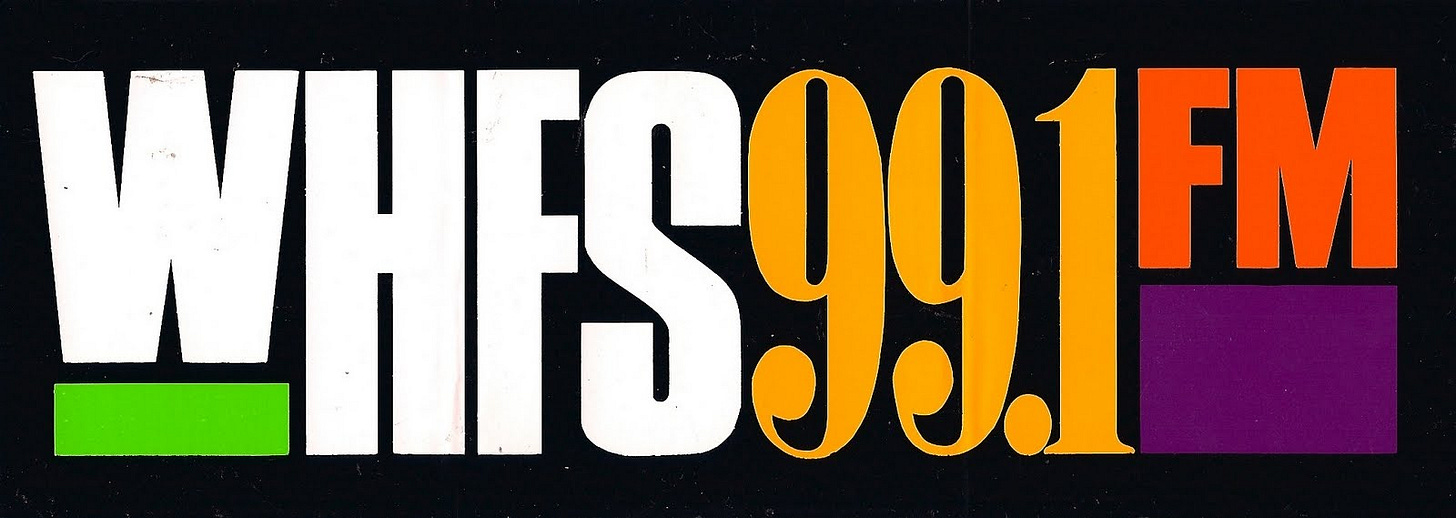When the DJ Scoffed
A memory about confidence, culture, and the sound that changed how I listen
You can listen to me narrate this article by clicking the voice over button above!
This space is my studio log—essays and experiments at the point where technology, creativity, and culture meet—written by someone who believes tech should help us live, love, and work better. We’ll start simple with a playlist, and a story about a terrible phone, a beloved radio station, and a single sound I’ll never forget. Hit the subscribe to get my content in your inbox!
What’s Inside This Week
My Monthly music playlist for October 2025, called October Voltage.
Playlists links for Spotify (recommended), Apple Music, YouTube, and Amazon.
A Personal Story of Embarrassment and Prizes is about a time when I got free music even though I wasn’t paying attention.
The Rabbit Hole is where I keep my footnotes. Where do you keep yours?
Monthly Playlist: October Voltage
This month’s playlist is pretty energetic—full of songs that get me moving and grooving. I’ve named it October Voltage. It’s perfect as background music for chores, driving, impromptu dance parties, or making out. There is a pretty wide mix of genres on here, and lots of stuff you probably haven't heard before.

Where to Listen
You can use any of the links below to listen, but I’d recommend using Spotify1 if you can. They have a new “mix” feature for playlists (in beta), and I used it to smooth out a lot of the transitions. It unfortunately doesn’t work on all their supported devices yet, but it’s a good start! Just make sure you tap the “mix” button on the app’s playlist screen and it should work!
Listen to my monthly playlist October Voltage on any of these services:
🎧 Spotify | Apple Music | YouTube Music | Amazon Music
A Personal Story of Embarrassment and Prizes
What’s the most embarrassing thing you’ve ever said to a personal hero? One of mine was in 2001, uttered into a terrible Nokia-ish phone, while stuck in traffic. It was just a few words, and I still remember the single-sound response I got back in return.
To understand why a single sound had such a big impact on me, you have to understand that in the Washington D.C. radio landscape of the early 2000s, rock music didn’t matter at all. It was so unloved that only one rock station - DC 101 - was even in the top 10. This was the most mainstream station too, the one that played the most radio friendly and most popular songs. From bands everyone knew and liked, like the Foo Fighters,2 Metallica, and Alice in Chains.
Baltimore’s 98 Rock was around too, but it played a strange mix of classic rock and prog metal. They’d play Deep Purple’s Smoke on the Water,3 but then the DJ would play a 4-minute Dreamtheater song. It was … weird. There was also 94.7, which called itself “The Arrow”. It played 1970’s radio and album hits, like Hendrix’s All Along the Watchtower (but never Dylan’s original), along with lots of visits to Hotel California.
And then there was 99.1 WHFS. HFS (as it called itself) had everything you’d expect from a low market share indie progressive rock station in one of the country’s largest metro areas - an edgy logo, annual festivals, DJs with invented names4, and music you couldn’t hear anywhere else. It was the only station I knew that might play The Impression That I Get, Bigmouth Strikes Again, Come Out and Play, and Firestarter in the same hour.
Listening to WHFS felt “underground” in the best sense. It carried a weird ethos too, like it was a college station run by dropouts who didn’t care much for school—or for anyone or anything else, really. It was remarkable that HFS existed when it did in the way that it did, especially when most of the area didn’t care for its music.
The early 2000s was a different time for music. Before streaming. Before digital. Before the Internet. If you wanted to listen to music in the car or at work, you either brought it with you, or you listened to the radio. And carrying around stacks of heavy, fragile plastic, in the form of CDs and tapes, got really old really fast. So everyone listened to the radio. And that made radio DJs gods. They were revered! They had access to ALL the music! They could play whatever they wanted whenever they wanted. Especially on HFS, which, as far as I could tell, seemed to have only one rule: don’t play music that sucks.
HFS had this weekly evening segment called New Music Mondays5 where the DJ would play a song not yet in rotation. Some songs were forgettable, some were instant hits, and some were deep cuts from well known bands. But the real draw was the call in. If you got through you got a free CD. And what’s better than free swag from the coolest radio station in town?
One night in 2001, as I started my 75-minute nightly commute home, I called in to New Music Monday. I worked in Tyson’s Corner, VA at the time, which during dark weekday evenings around the winter holidays, felt like the sliding puzzle game Rush Hour6. It was just you alone in your little car, frozen in place, while all of the other vehicles moved around you in bursts of commotion, freeing up just enough space for you to move forward a few feet. It was miserable.
My mobile phone at the time was a foldable gray plastic oval with a blue-glow keypad and a screen that wasn’t much bigger than a calculator watch7. Calls sounded like they’d been transmitted from a haunted seaside location—full of static and wind and ghost sounds. You had to hold the phone to your face too; there was no speakerphone, no Bluetooth, no mercy.
That night, as I inched forward in traffic, one hand on the wheel, one on the phone, I called the station. In one ear, the phone’s inaccurate yet somehow recognizable rendition of a phone ringing; in the other, a new song from an unfamiliar artist. I do my best to pay attention to both, and also the other, barely moving cars around me. Safety was not my concern, because of the gridlock, but boy I wanted that CD.
Then—the sound. A click, a hiss, a faint electronic woosh.8 If you’ve ever called in to a radio station, you’ve heard it too. It the sound that means someone at the station picked up, and you were connected.9
“HFS!” A man’s voice. Hollow. Distant. “What’s your name?” “My name?” “Yeah—you called in to New Music Monday! What’s your name?” “Uh ... Rob.” “Rob, what did you think of the song?”
I wasn’t prepared for this question. At all. I’m not sure why. I’d heard the segment before. But the question still took me by surprise. I had nothing to say! I was barely listening to the song! I didn’t answer for a few beats. It felt like forever. But I’m nothing if not confident. So I started talking.
“You know what I liked,” I said—half a question, half a stall. “The words…” I paused, flailing for sophistication. “The lyrics. They… they really matched the music.”
I remember the feelings: pride, accomplishment, and a serene conviction that I had just uttered the most profound observation on music ever spoken aloud. That’s how confident I was in my answer. With all of the chaos going on around me at that moment, I felt like I’d crushed it. Wow, was I wrong.
“Ffft,” the DJ responded. A pause. Then a quick, “… yeah.” with a half-laugh.
The “Ffft” sound he made is what I remember most. It was a scoffing sound. A sound you might hear in middle school, just after you asked a girl who was way out of your league to the 8th grade dance. A sound you might hear from your friend, just after you made an over-confident boast that both of you knew wasn’t possible. A sound that, when coming from one of your DJ idols at the most counter-culture radio station within 100 miles, was definitely not a compliment. A sound that, to my ears, was cool-kid shorthand for, “I heard what you said, but your response was so stupid and insignificant that to form any verbal response at all would be a waste of my life. So instead, I will exhale the breath I was reserving, as it is no longer needed for sound.”
Time slowed down. The traffic vanished. I felt less like Neo dodging bullets in the Matrix10, and more like I was 12 years old and said something dumb in front of the whole class.
“Well … Rob? Please stay on the line so we can get your info!”
I still think about that moment. But now almost 30 years later, having processed all the shame I felt over the last three decades, I think about the DJ. What kind of day was he having? Maybe he’d been waiting all week for New Music Monday. Maybe he regretted choosing my call—the one guy whose answer managed to be both confident and useless. Or maybe he was delighted. Maybe my stupid comment made good radio. Or maybe, just maybe, he agreed with me. Either way, I eventually got my free CD.
This memory captures the spirit of what I loved about ‘HFS—it was a little awkward, a little weird, and they definitely didn’t care. This month’s playlist is a tribute to that feeling. It’s full of artists who follow their own path and music that, I hope you’ll agree, at least follows HFS’ rule: it definitely doesn’t suck.
This essay is part of my ongoing studio log exploring how technology, creativity, and culture can help us live, love, and work better — one memory, one thought, one sound at a time.
Yours from the studio,
Rob
The Rabbit Hole
The footnotes below are probably an amazing waste of your time…
[LISTEN]: Here is this month’s playlist in case you want to listen while you read! [1h 1m]
[WATCH]: Dave Grohl’s story of why Christopher Walken’s SNL intro is so epic. [1m 0s]
[WATCH]: The official video released last year (?!?!) for this 50+ year old song. [6m 14s]
[READ]: One fan’s nostalgia for WHFS DJ Weasel and his love of obscure songs
[NOTE]: I’m pretty sure it was Monday, but it may have been another day of the week. Does anyone remember the specific day and time of this segment?
[READ]: Michael Folgleman made an interesting database of Rush Hour configurations
[SHOP]: Casio apparently still makes its iconic calculator watch.
[NOTE]: Does anyone know the official name for this sound? I can’t find anything!
[NOTE]: I’ve done my best here to describe this moment of my life, but it was 25+ years ago and I am probably misremembering things. If you have this recorded, let me know!
[WATCH]: Corridor Crew covers the history of bullet time in great detail, and recreates this iconic shot sequence with their own modern twist [30m 24s]


